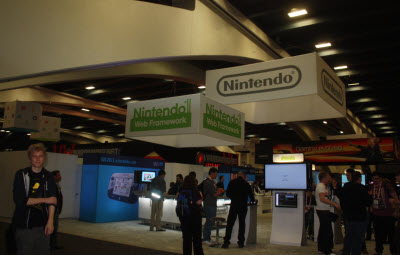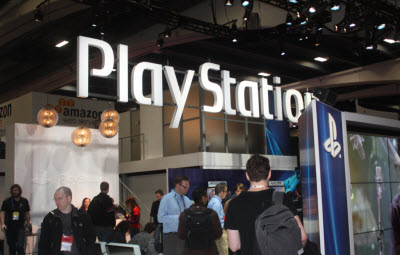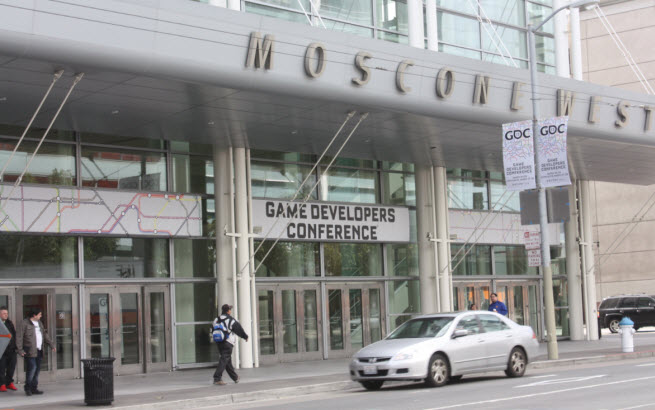The 2013 Game Developers Conference drew more than 23,000 attendees, matching the number of attendees from a year ago despite a huge amount of turmoil in the video game industry. About half of those attendees are indie game developers, making up for a lot of the attendees who may have dropped out because they lost jobs at traditional game companies.
 The event ran the spectrum of gaming, including Electronic Arts’ unveiling of its big-budget Battlefield 4 first-person military shooter and discussions about women’s issues in the 1ReasonToBe session. The attendees went to more than 500 sessions, visited the sprawling expo floor with 350 booths, and participated in events such as the Game Developers Choice Awards and Independent Games Festival Awards. (Here’s our complete coverage of the GDC).
The event ran the spectrum of gaming, including Electronic Arts’ unveiling of its big-budget Battlefield 4 first-person military shooter and discussions about women’s issues in the 1ReasonToBe session. The attendees went to more than 500 sessions, visited the sprawling expo floor with 350 booths, and participated in events such as the Game Developers Choice Awards and Independent Games Festival Awards. (Here’s our complete coverage of the GDC).
UBM Tech Game Network, which owns the GDC, said that next year’s event will be held at the Moscone Convention Center in San Francisco from March 17 to March 21.
At the Game Narrative Summit, Microsoft senior game designer Richard Rouse III talked about the ways developers can write games with a solid foundation of morality and engagement. In the Free to Play Design & Business Summit, King.com’s Tommy Plam talked about the strategy that enabled the company to turn Candy Crush Saga into a hit on both Facebook and mobile.
The main conference started on Wednesay and featured the final edition of The Game Design Challenge. Under the theme “Humanity’s Last Game,” indie game designer Jason Rohrer won the competition with his proposal for a game. The title, A Game for Someone, is a board game locked away in a titanium tube and buried under the Nevada desert. Attendees at the session were given a unique sheet of paper in an envelope, with each paper listing 900 different global positioning system coordinates. Only one of the coordinates in the envelopes had the true location of the game. Rohrer estimated that if one person visits a GPS location each day with a metal detector, searching for the titanium tube, the game would be unearthed in a million days.
 Hideo Kojima shared the first look at Metal Gear Solid 5 during a talk on game design, and he confirmed plans for a new development office for Kojima Productions in Los Angeles. The title will use a new Fox engine that will reportedly bring more innovation to the game-making process.
Hideo Kojima shared the first look at Metal Gear Solid 5 during a talk on game design, and he confirmed plans for a new development office for Kojima Productions in Los Angeles. The title will use a new Fox engine that will reportedly bring more innovation to the game-making process.
A controversial party sponsored by the International Game Developers Association and YetiZen made headlines, since the party had female dancers in racy garb. It prompted resignations from the IGDA and an official apology from the IGDA’s executive director. Another session tackled the scapegoating of the game industry in game violence debates, and still another focused on sexism in games.
Among the gaming companies making announcements about new systems were Oculus Rift, PlayJam’s GameStick, Ouya, and Sony, which described its PlayStation 4 next-gen console in a session.
In the classic game postmortem series, veteran game developers talked about how they created their games. The series included Franz Lanziger discussing Crystal Castles; Robyn Miller talking about the creation of Myst; Bill Budge lecturing about his inspirational Pinball Construction Set; and Julian Gollop talking about the origins of X-COM: UFO Defense.
 At the IGF awards, Cart Life creator Richard Hofmeier won the Seumas McNally Grand Prize award and its associated $30,000 grand prize. At the Game Developers Choice Awards, Thatgamecompany’s Journey won six of the evening’s eleven main awards, including Best Audio, Best Game Design, Best Visual Arts, Best Downloadable Game, the Innovation Award, and the coveted Game of the Year Award. At the Women in Gaming Awards, Brenda Romero picked up a lifetime award for her decades-long work in the industry.
At the IGF awards, Cart Life creator Richard Hofmeier won the Seumas McNally Grand Prize award and its associated $30,000 grand prize. At the Game Developers Choice Awards, Thatgamecompany’s Journey won six of the evening’s eleven main awards, including Best Audio, Best Game Design, Best Visual Arts, Best Downloadable Game, the Innovation Award, and the coveted Game of the Year Award. At the Women in Gaming Awards, Brenda Romero picked up a lifetime award for her decades-long work in the industry.
Sessions will be available for viewing on the GDC Vault. Be on the lookout for more GamesBeat coverage.
“With the game development industry evolving at a faster clip than ever before, we find both the profile of the developer and the types of games represented at GDC also growing to include new and different people and interests,” said Meggan Scavio, general manager of the GDC, in a statement. “The response we’ve gotten to this year’s event makes us feel confident that the changes we’ve made, such as the introduction of the Advocacy Track and the Free to Play Game Design and Business Summit, have helped evolved the conference to be even more inclusive. We are thrilled to continue to be a place where members of the profession can connect, discuss and showcase, and look forward to continuing the tradition in upcoming events.”
VentureBeat's mission is to be a digital town square for technical decision-makers to gain knowledge about transformative enterprise technology and transact. Learn More

